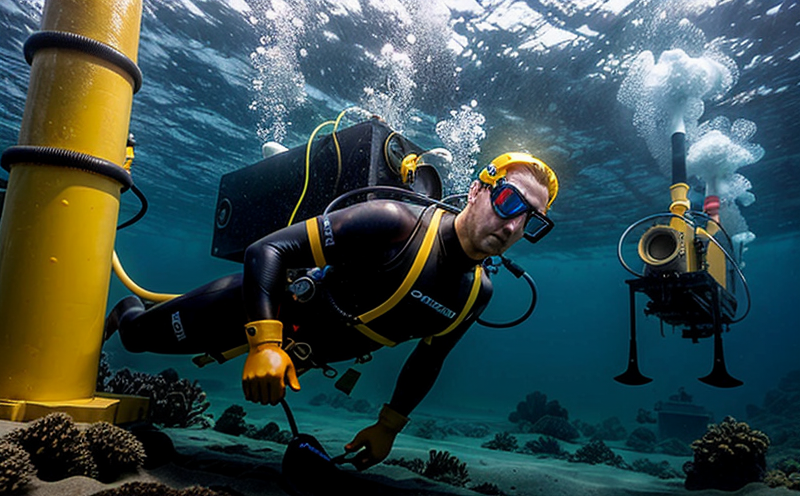API 17F Subsea Control System Testing
The API 17F standard is a critical document in the oil and gas industry, specifically addressing subsea control systems used for managing production from offshore fields. This service focuses on ensuring that these systems meet stringent performance criteria to prevent failures during critical operations such as wellhead isolation, blowout prevention, and containment.
The testing process involves a series of rigorous evaluations designed to simulate real-world conditions under which subsea control systems operate. These include high-pressure environments, extreme temperatures, and the corrosive effects of seawater. The API 17F standard ensures that these systems are reliable, safe, and capable of withstanding the harsh conditions found in deep-water and ultra-deep-water operations.
The testing protocol outlined in API 17F is comprehensive, involving multiple phases to ensure compliance. Initial inspection checks the conformity of materials used in the system against established standards. Functional tests then verify that all components operate as intended under controlled conditions. Environmental stress screening subjects the control systems to simulated operational stresses like temperature cycling and vibration.
A critical part of this testing is the fluid flow simulation, where the control systems are tested for their ability to manage fluid flows accurately. This ensures the integrity of the wellhead and the safety of personnel working in these environments. The testing also includes pressure testing, which involves applying controlled pressures to simulate the conditions found during drilling operations.
Another important aspect is the verification of electrical interfaces within the control systems. Ensuring that all electronic components function correctly under extreme conditions is crucial for preventing malfunctions that could lead to safety hazards or production downtime. The API 17F standard also emphasizes the importance of conducting a comprehensive failure analysis, which involves identifying any potential weaknesses in the design and recommending improvements.
The testing process concludes with a final inspection and acceptance criteria check. This ensures that all aspects of the subsea control system meet the stringent requirements set by API 17F. Compliance with these standards is essential for operators to ensure they are using reliable equipment that can withstand the rigors of offshore operations.
In addition to meeting industry standards, compliance also provides legal and regulatory protection, ensuring that all systems are up-to-date and in line with international best practices. This comprehensive testing service not only enhances operational safety but also contributes significantly to reducing environmental impact by preventing accidental releases into the marine environment.
Benefits
- Enhanced Reliability: Ensures that subsea control systems are reliable and capable of withstanding harsh conditions, reducing the risk of failures during critical operations.
- Safety Enhancement: By ensuring compliance with API 17F standards, this service contributes to a safer working environment for personnel involved in offshore operations.
- Environmental Protection: Prevents accidental releases into the marine environment by ensuring that all systems meet strict performance criteria.
- Legal and Regulatory Compliance: Ensures that operators are using equipment that meets international standards, providing legal protection against potential liabilities.
Industry Applications
The API 17F Subsea Control System Testing service is widely used in the oil and gas industry for ensuring the reliability of subsea control systems. These systems are crucial for managing production from offshore fields, particularly in deep-water and ultra-deep-water environments where conventional methods are not feasible.
Operators use this testing to verify that their equipment can withstand the extreme conditions encountered in these operations, including high-pressure environments, corrosive seawater, and temperature variations. The service is also valuable for ensuring compliance with international standards such as API 17F, which helps operators meet regulatory requirements.
By leveraging this testing service, operators can ensure that their subsea control systems are not only reliable but also capable of withstanding the rigors of offshore operations. This contributes to safer and more efficient operations, ultimately enhancing overall performance and reducing operational risks.
Environmental and Sustainability Contributions
- Reduction in Environmental Impact: By ensuring that subsea control systems are reliable and capable of withstanding harsh conditions, this service helps prevent accidental releases into the marine environment.
- Sustainable Operations: Compliance with API 17F standards ensures that operators are using equipment that meets international best practices, contributing to more sustainable operations.
- Economic Efficiency: Reducing operational risks through reliable testing leads to more efficient and cost-effective operations in the long term.





